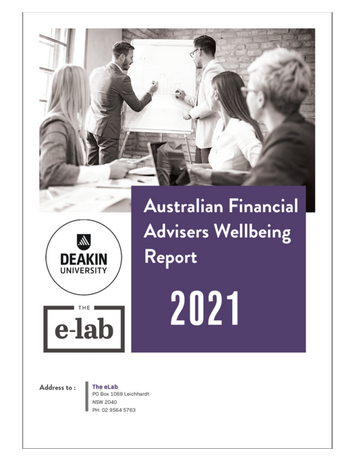A first-of-its-kind research study into the wellbeing of Australian financial advisers has found poor levels of mental and physical health, with respondents pointing to regulatory and compliance demands as the number one source of stress in their work lives.
Sponsored by AIA Australia, the key findings of the research (which used data collected from more than 700 Australian financial advisers) included:
- 73 percent of respondents are experiencing high levels of burnout from stress
- 67 percent experience some level of depression – ranging from ‘a little of the time’ to ‘all the time’
- 61 percent have poor sleep due to stress
- 33 percent of respondents are seeking medical care to manage their health symptoms caused by stress in their roles
- 25 percent indicated that their medical practitioner has advised them that they are in a high-risk category for heart disease or stroke
A statement from AIA Australia says that while the survey found that advisers find meaning and purpose in their work, 77 percent also felt high levels of frustration.

“Significantly, 82 percent of advisers said they found regulatory and compliance demands to be highly or very highly stressful,” the statement says.
The research was carried out by Dr Adam Fraser founder of The e-lab and Dr John Molineux from Deakin University in late 2020 and sought an understanding of the key challenges experienced by financial advisers.
Fraser says that they did the research to help the people who invest so much time and energy into improving the financial security of Australians.
…advisers had… higher scores in terms of stress, burnout and work overload, than any industry we had previously studied…
“Concerningly, we found that advisers had the lowest scores in areas of wellbeing, mental and physical health and higher scores in terms of stress, burnout and work overload, than any industry we had previously studied.”
AIA Australia says the research has highlighted the importance of the advice industry collaborating and supporting advisers to navigate new regulatory and compliance requirements.
The insurer notes that while the research raises concerns about the future of the advice profession, at a time when Australians are already challenged by a lack of access to affordable financial advice, it also found that some survey participants were thriving, and there were learnings from which others can draw to improve their resilience.
It says the were key differentiators between those who were thriving and those who were not included:
- Engagement with industry support services and associations
- A positive work/life balance
- Practising regular recovery activities such as exercise or mindfulness
- Having collegiate support
CEO and Managing Director of AIA Australia and New Zealand, Damien Mu, says AIA Australia is concerned with the results, which he says highlight the critical challenges that the advice industry is facing: “It is vitally important that steps are taken to support adviser wellbeing, so that they can continue their important work of assisting Australians to make informed financial decisions, both in good times and in bad.”
Mu continued, “Although we have identified that there are several factors impacting the health and wellbeing of financial advisers, it is positive to note that there are many professionals in this field who are thriving. We hope that this research is informative and inspires positive change to improve the advice industry for the better.”
(See also: AIA Health-Mental Wellbeing Steps from AFL Players.)
Click here for the complete findings of the Australian Financial Advisers Wellbeing Report.





Damian Mu’s comment is strange. Do you think he even knew AIA was undertaking the research? Maybe next time grab a quote from someone at AIA who gives a hoot.
Agree SydneyCider. Damien, exactly what percentage of advisers are thriving? Also, I would be interested to know what the percentages are for those advisers who specialise in Life Insurance only. Life BDM’s I have spoken to over the past few months are telling advisers that LIF and FASEA are set in concrete, and we all just have to accept it! If that is the attitude of the retail insurers, then don’t be surprised if the adviser numbers continue to drop (as was reported last week in Risk Info), and the statistics included in the above article continue to worsen. Life Insurers – get the message! The industry will NOT survive under these conditions.
very odd comment by the CEO, you guys over there with depression – have a look at all the other guys over here doing really well – that will make you feel better!
I really appreciated AIA undertaking this survey and was in online attendance the day the figures were first revealed. I knew how I’d been suffering personally but was staggered to see just how bad the mental health of other advisers is.
What I did NOT appreciate on the day though was Damien’s comments about the “huge opportunity this situation represented for advisers who stick around and how we’re expected to continue navigating through it”.
Thousands of us have put up with this utter cr** for years now. Its now time the regulators, insurance companies and Government accepted responsibility for the disaster this industry has become as a result of their mistakes, their greed and their agenda’s.
Its time THEY made the changes and rolled back the Best Industry Duty, LIF Reform and FASEA debacles and paid advisers a reasonable remuneration figure for the mountains of work they’ve created for us which has not had anywhere near the positive impact on this industry that they all said they wanted.
Its clearly had the exact opposite affect so something needs to give, advisers have clearly had enough and aren’t coping.
Comments are closed.